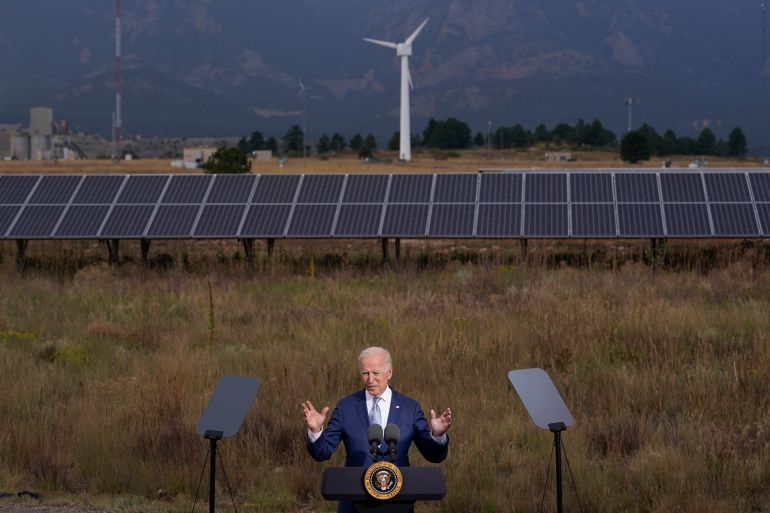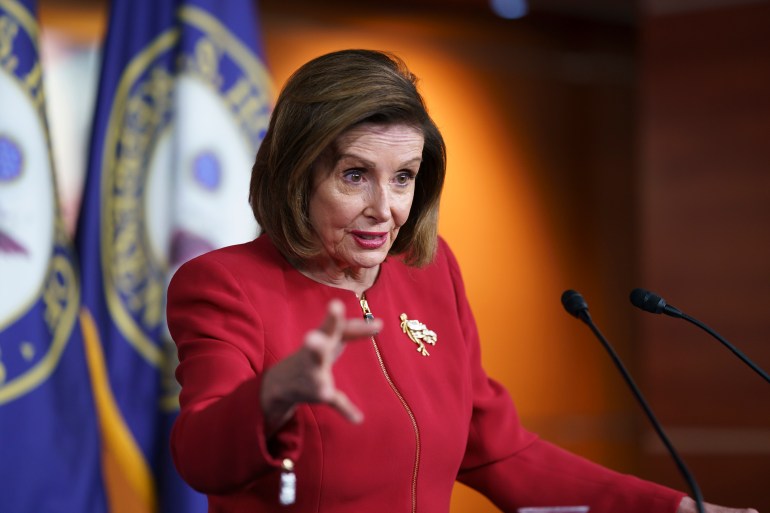US Democrats face consequential week on infrastructure overhaul
Pending legislation could have wide-ranging implications for midterm elections and Biden’s domestic approval.

The United States Congress is set to consider two pieces of key infrastructure legislation in the coming days, in a week for Democrats that is expected to have wide-ranging implications for the presidency of Joe Biden and next year’s midterm elections.
Democrats’ ability to unify behind two infrastructure bills – one a $1 trillion package aimed at physical infrastructure, the other, a $3.5 trillion package that encompasses social investments – would represent a significant move towards the nation’s largest tax and spending priorities overhaul in decades. It would also prove a big success for the bedrock policies of the Biden administration.
Keep reading
list of 3 itemsBiden’s railroad plans: Rail renaissance or just ‘train envy’?
A win for Biden, US Senate passes $1 trillion infrastructure bill
“Let me just say, it’s an eventful week,” House Speaker Nancy Pelosi, the most powerful Democrat in the chamber, told ABC’s This Week programme.
In a vote originally set for Monday, the House is now set to vote on the $1 trillion physical infrastructure package on Thursday. The package, which has already passed in the Senate, appears to have bipartisan support in the House, but opposition from Republican brass and discontent among some progressive legislators could scuttle its passage.
Asked at the White House on Sunday whether Pelosi had the votes needed to pass the bill, Biden said: “I’m optimistic about this week. It’s going to take the better part of the week, I think.”
At issues for progressives, who occupy the left flank of the Democratic Party, is the larger $3.5 trillion social infrastructure plan, which is still being negotiated amid concerns from Republicans and some moderate Democrats over its high price tag.
Some progressives, meanwhile, have said they will not support the $1 trillion bill until Congress takes action on the $3.5 trillion bill, which adds funding to existing health, education and childcare programmes alongside new federal efforts to curb climate change.
A deal’s a deal. We don’t pass the infrastructure bill without passing the Build Back Better Act, investing in child care, climate action, paid leave, housing, health care, education, and a roadmap to citizenship.
Let’s get this done and deliver for the people.
— Rep. Pramila Jayapal (@RepJayapal) September 26, 2021
Pelosi has not set a date for a vote on the larger bill in the House, as legislators and the Biden administration continue to negotiate its shape to assure it will pass in the Senate.
Two Democrats in the Senate – Joe Manchin and Kyrsten Sinema – have said they will not support the bill at its current size. Democrats have only a razor-thin simple majority in the chamber, which is split 50-50 between the two parties. Vice President Kamala Harris casts deciding votes in the event of a tie.
Gov’t funding deadline
Adding to the urgency of the week, Congress is also fast approaching a Thursday deadline to continue funding federal agencies or face the second partial government shutdown in three years.
“We have to make sure we keep the government open and we will,” Pelosi said on Sunday.

In late October or early November, the US Treasury will run out of money to pay its obligations, meaning the government faces the risk of a historic default if Congress does not act.
The Senate will hold a procedural vote on Monday evening on legislation that has already passed the House to fund the government through December 3 and suspend the nation’s borrowing limit until the end of 2022.
Republicans say they oppose the bill because it includes a suspension of the debt limit, and while they oppose allowing the US government to default, they want Democrats to suspend the debt limit without their votes.